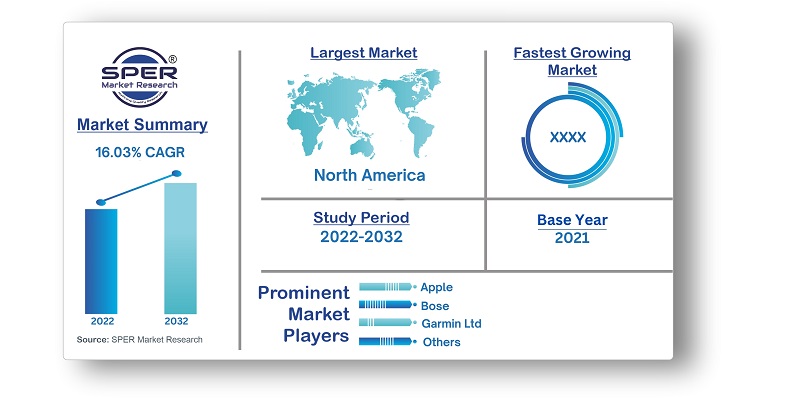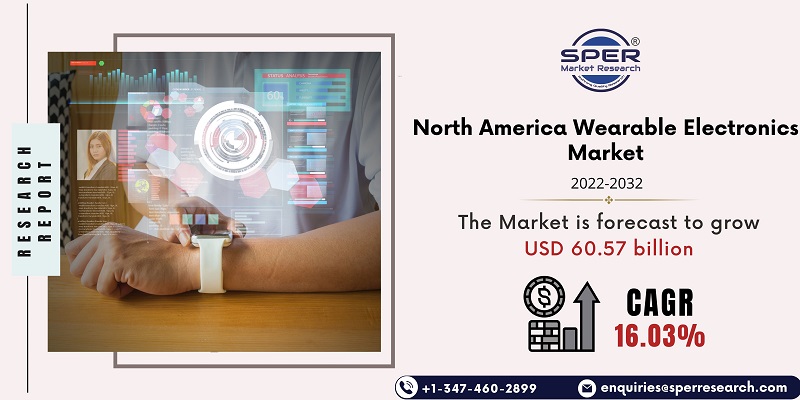
North America Wearable Electronics Market Growth, Size, Trends, Revenue and Future Scope 2032
North America Wearable Electronics Market Size- By Product, By Components, By Connectivity, By Type of End User Industry- Regional Outlook, Competitive Strategies and Segment Forecast to 2032
| Published: Mar-2023 | Report ID: FMCG2335 | Pages: 1 - 153 | Formats*: |
| Category : Consumer & Retail | |||
- November 20, 2022 - Amazfit, a global brand of wearable technology owned by Zepp Health, has debuted the fourth generation of its GTR and GTS series in Qatar with the support of Intertec Group, which serves as the country of Qatar's authorized distributor for Amzfit smart watches. The new watches have superior athletic capabilities, large HD AMOLED displays, and the industry's first circularly polarised GPS antenna technology, all packaged in stylish designs.
- In October 2022, Xiaomi launched the Smart Band 7 Pro in the United Arab Emirates. The Xiaomi Smart Band 7 Pro increases every discriminating user's watching experience in a much more practical and delightful way, thanks to its wider viewing area and auto-brightness feature, without sacrificing its gorgeous details.


| Report Metric | Details |
| Market size available for years | 2019-2032 |
| Base year considered | 2021 |
| Forecast period | 2022-2032 |
| Segments covered | By Product, By Components, By Connectivity, By Type of End User Industry |
| Regions covered | United States, Mexico, Canada |
| Companies Covered | Apple, Bose, Fitbit, Garmin Ltd, Huawei, LG Electronics, Nike, Samsung Electronics Co. Ltd., Sony, Xiaomi Inc. |
- Wearable Electronics Products Manufacturers
- Consumer Electronics Products Manufacturers
- Wearable App Developers
- Raw Material Suppliers for Wearable Electronics Products
- Potential Investors in Wearable Electronics
- Wearable Electronics Distributors
- Wearable Electronics Advocacy Groups
- Others
| By Product: |
|
| By Components: |
|
| By Connectivity: |
|
| By Type of End User Industry: |
|
- North America Wearable Electronics Market Size (FY’2023-FY’2032)
- Overview of North America Wearable Electronics Market
- Segmentation of North America Wearable Electronics Market By Product (Wrist Wear, Ear Wear and Head Wear, Eye Wear, Foot Wear, Neck Wear, Body Wear and Smart Clothing)
- Segmentation of North America Wearable Electronics Market By Components (Networking and Positioning Components, Power Supply Components, Sensing Components, Optoelectronic and Display Components, Control Components, Interface Components)
- Segmentation of North America Wearable Electronics Market By Connectivity {Near Field Communication (NFC), Cellular Network, Bluetooth Technology, Wi-Fi Network, Other Connectivity Types}
- Segmentation of North America Wearable Electronics Market By Type of End User Industry {Fitness and Sports & Tracker, Healthcare, Entertainment and Travel & Hospitality, Industrial (Logistics & manufacturing), Government (Defence, Security, and Public Administration)}
- Statistical Snap of North America Wearable Electronics Market
- Expansion Analysis of North America Wearable Electronics Market
- Problems and Obstacles in North America Wearable Electronics Market
- Competitive Landscape in the North America Wearable Electronics Market
- Impact of COVID-19 and Demonetization on North America Wearable Electronics Market
- Details on Current Investment in North America Wearable Electronics Market
- Competitive Analysis of North America Wearable Electronics Market
- Prominent Players in the North America Wearable Electronics Market
- SWOT Analysis of North America Wearable Electronics Market
- North America Wearable Electronics Market Future Outlook and Projections (FY’2023-FY’2032)
- Recommendations from Analyst
1.1. Scope of the report1.2. Market segment analysis
2.1 Research data source2.1.1 Secondary data2.1.2 Primary data2.1.3 SPER’s internal database2.1.4 Premium insight from KOL’s2.2 Market size estimation2.2.1 Top-down and Bottom-up approach2.3 Data triangulation
4.1. Driver, Restraint, Opportunity and Challenges analysis4.1.1 Drivers4.1.2 Restraints4.1.3 Opportunities4.1.4 Challenges4.2. COVID-19 Impacts of the North America Wearable Electronics Market
5.1. SWOT analysis5.1.1 Strengths5.1.2 Weaknesses5.1.3 Opportunities5.1.4 Threats5.2. PESTEL analysis5.2.1 Political landscape5.2.2 Economic landscape5.2.3 Social landscape5.2.4 Technological landscape5.2.5 Environmental landscape5.2.6 Legal landscape5.3. PORTER’S five forces analysis5.3.1 Bargaining power of suppliers5.3.2 Bargaining power of Buyers5.3.3 Threat of Substitute5.3.4 Threat of new entrant5.3.5 Competitive rivalry5.4. Heat map analysis
6.1 North America Wearable Electronics Manufacturing Base Distribution, Sales Area, Product Type6.2 Mergers & Acquisitions, Partnerships, Product Launch, and Collaboration in North America Wearable Electronics Market
7.1 Wrist Wear7.2 Ear Wear and Head Wear7.3 Eye Wear7.4 Foot Wear7.5 Neck Wear7.6 Body Wear and Smart Clothing
8.1 Networking and Positioning Components8.2 Power Supply Components8.3 Sensing Components8.4 Optoelectronic and Display Components8.5 Control Components8.6 Interface Components
9.1 Near Field Communication (NFC)9.2 Cellular Network9.3 Bluetooth Technology9.4 Wi-Fi Network9.5 Other Connectivity Types
10.1 Fitness and Sports & Tracker10.2 Healthcare10.3 Entertainment and Travel & Hospitality10.4 Industrial (Logistics & manufacturing)10.5 Government (Défense, Security, and Public Administration)
11.1 North America Wearable Electronics Size and Market Share by Region (2019-2025)11.2 North America Wearable Electronics Size and Market Share by Region (2026-2032)11.3 United States11.4 Canada11.5 Mexico
12.1 Apple Inc.12.1.1 Company details12.1.2 Financial outlook12.1.3 Product summary12.1.4 Recent developments12.2 Bose12.2.1 Company details12.2.2 Financial outlook12.2.3 Product summary12.2.4 Recent developments12.3 Fitbit12.3.1 Company details12.3.2 Financial outlook12.3.3 Product summary12.3.4 Recent developments12.4 Garmin Ltd12.4.1 Company details12.4.2 Financial outlook12.4.3 Product summary12.4.4 Recent developments12.5 Huawei12.5.1 Company details12.5.2 Financial outlook12.5.3 Product summary12.5.4 Recent developments12.6 LG Electronics12.6.1 Company details12.6.2 Financial outlook12.6.3 Product summary12.6.4 Recent developments12.7 Nike12.7.1 Company details12.7.2 Financial outlook12.7.3 Product summary12.7.4 Recent developments12.8 Samsung Electronics Co. Ltd.12.8.1 Company details12.8.2 Financial outlook12.8.3 Product summary12.8.4 Recent developments12.9 Sony12.9.1 Company details12.9.2 Financial outlook12.9.3 Product summary12.9.4 Recent developments12.10 Xiaomi Inc.12.10.1 Company details12.10.2 Financial outlook12.10.3 Product summary12.10.4 Recent developments
SPER Market Research’s methodology uses great emphasis on primary research to ensure that the market intelligence insights are up to date, reliable and accurate. Primary interviews are done with players involved in each phase of a supply chain to analyze the market forecasting. The secondary research method is used to help you fully understand how the future markets and the spending patterns look likes.
The report is based on in-depth qualitative and quantitative analysis of the Product Market. The quantitative analysis involves the application of various projection and sampling techniques. The qualitative analysis involves primary interviews, surveys, and vendor briefings. The data gathered as a result of these processes are validated through experts opinion. Our research methodology entails an ideal mixture of primary and secondary initiatives.



Frequently Asked Questions About This Report
PLACE AN ORDER
Year End Discount
Sample Report
Pre-Purchase Inquiry
NEED CUSTOMIZATION?
Request CustomizationCALL OR EMAIL US
100% Secure Payment






Related Reports
Our Global Clients
Our data-driven insights have influenced the strategy of 200+ reputed companies across the globe.






















